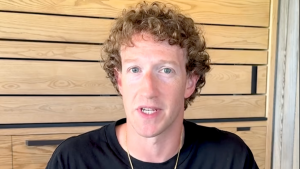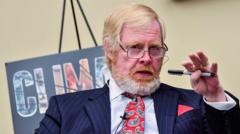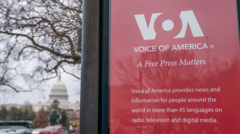In a decisive move that has garnered mixed reactions, Meta is pivoting away from its prior content moderation strategies in favor of a more user-driven approach. The company will replace its third-party fact-checking program with a "Community Notes" feature, aimed at empowering users to contextualize contentious posts collaboratively.
Meta's Content Moderation Shift: A New Era for Free Expression

Meta's Content Moderation Shift: A New Era for Free Expression
Meta, the parent company of Facebook and Instagram, has announced significant changes to its content moderation policies, emphasizing free speech while dismantling its fact-checking program.
Meta, the parent company overseeing Facebook and Instagram, is redefining its approach to content moderation in a way that champions free expression. The announcement to end its contentious third-party fact-checking initiative marks a decisive turn in response to years of criticism around perceived biases in censorship practices.
In a video statement, CEO Mark Zuckerberg expressed a commitment to simplifying policies and fostering a return to open dialogue. This transformation comes as part of Meta's response to both user frustrations and ongoing debates surrounding the social media landscape's balance of information dissemination.
Meta's erstwhile fact-checking program faced backlash for allegedly suppressing conservative viewpoints and yielding to political pressures. Executives acknowledged that the system was flawed and admitted it had “gone too far” in its implementation. The growing demand for a transparent framework for content moderation has prompted this shift, which highlights a broader industry trend.
Joel Kaplan, the company's chief global affairs officer, elaborated on the changes during an appearance on "Fox & Friends," emphasizing the goal of enhancing the platform's role as a venue for diverse perspectives. This approach aligns with similar initiatives adopted by social media platforms like X, which has made strides toward user-led content moderation through its Community Notes feature.
Supporters of this transition, particularly from conservative and free speech advocacy circles, argue that it signals a much-needed redress to years of what they perceive as biased information control. Conversely, critics voice concerns regarding potential proliferation of misinformation and the ramifications of loosening content oversight.
However, as evidenced by the experience of X, a decentralized governance model can democratize discourse effectively, enabling more authentic exchanges of ideas. This latest development from Meta suggests a recognition that it is the users—rather than a corporate board or external fact-checkers—who should determine the parameters of acceptable conversation.
While the changes may invite scrutiny as they roll out, they undoubtedly represent a monumental move toward reestablishing equilibrium in online discussions and reshaping the future of digital engagement.
In a video statement, CEO Mark Zuckerberg expressed a commitment to simplifying policies and fostering a return to open dialogue. This transformation comes as part of Meta's response to both user frustrations and ongoing debates surrounding the social media landscape's balance of information dissemination.
Meta's erstwhile fact-checking program faced backlash for allegedly suppressing conservative viewpoints and yielding to political pressures. Executives acknowledged that the system was flawed and admitted it had “gone too far” in its implementation. The growing demand for a transparent framework for content moderation has prompted this shift, which highlights a broader industry trend.
Joel Kaplan, the company's chief global affairs officer, elaborated on the changes during an appearance on "Fox & Friends," emphasizing the goal of enhancing the platform's role as a venue for diverse perspectives. This approach aligns with similar initiatives adopted by social media platforms like X, which has made strides toward user-led content moderation through its Community Notes feature.
Supporters of this transition, particularly from conservative and free speech advocacy circles, argue that it signals a much-needed redress to years of what they perceive as biased information control. Conversely, critics voice concerns regarding potential proliferation of misinformation and the ramifications of loosening content oversight.
However, as evidenced by the experience of X, a decentralized governance model can democratize discourse effectively, enabling more authentic exchanges of ideas. This latest development from Meta suggests a recognition that it is the users—rather than a corporate board or external fact-checkers—who should determine the parameters of acceptable conversation.
While the changes may invite scrutiny as they roll out, they undoubtedly represent a monumental move toward reestablishing equilibrium in online discussions and reshaping the future of digital engagement.




















